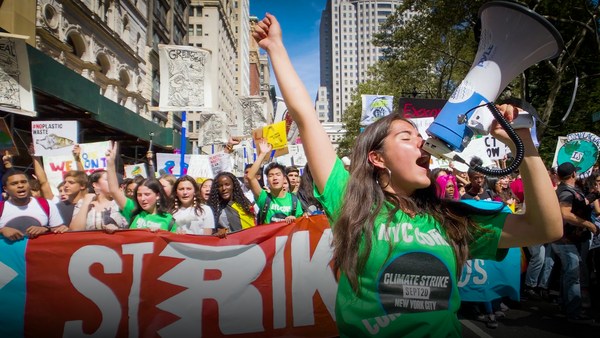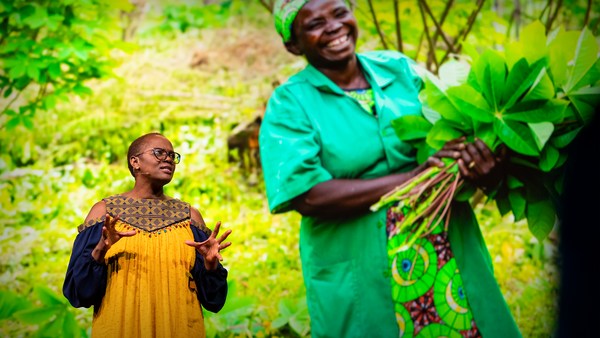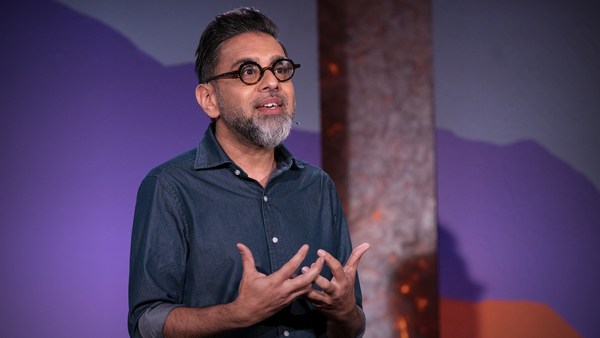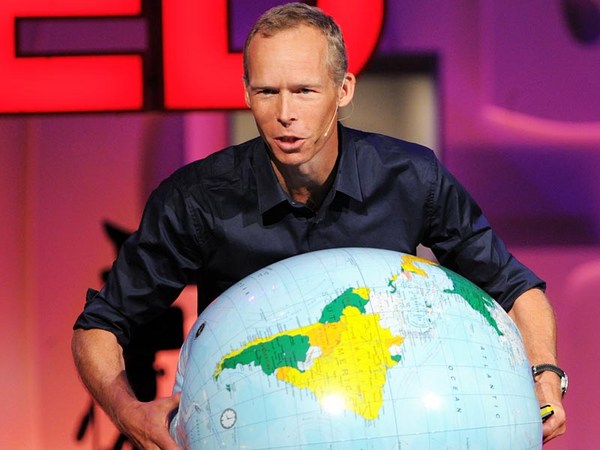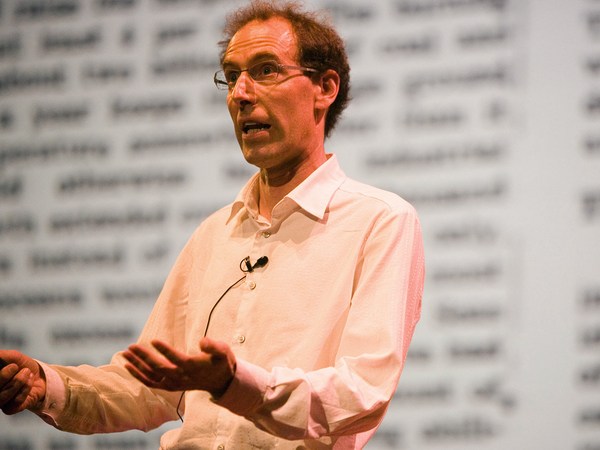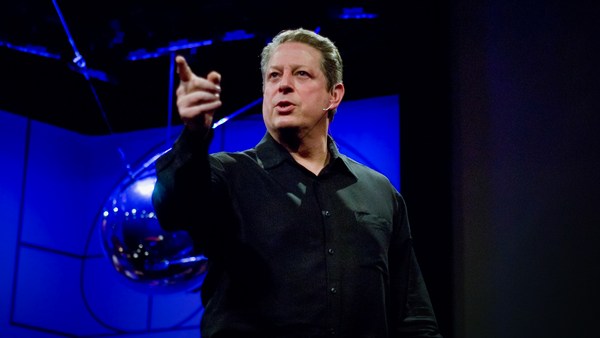My parents were really lucky. They met each other at the first Earth Summit in 1992, and they kept seeing each other at climate events for years to come until they fell in love. They weren't the coolest parents because they were the only people I knew talking about climate change, but they were the strongest parents. And that fire was passed on to me, the fire to stand up when almost nobody else is.
And this is something that I felt through different moments in my life, like when I was in second year of kindergarten and I was named Water Protector, which meant that I had to close the faucet every time my classmates washed their hands when we were five years old.
This fire also prepared me for the very worst. When I was 13 years old, my hometown in central Mexico, an indigenous community called San Pedro Tultepec, flooded up to my knees. The scary part was not the extent or the speed at which the flood came, but the color and the smell. The water came from the overflow of the Lerma River, one of the most contaminated rivers in the Americas, and it was full of waste from more than 2,000 factories in 10 industrial parks that feed a lot of Mexico City.
This is the moment that I realized that the climate crisis wasn't just about the climate disasters, the floods, the wildfires, the warming, but really magnifying a lot of injustices, like when our soil and our skin is polluted.
It was a turning point for me, and I went on to pursue relentless climate activism. I spoke at the United Nations for the first time at 15 years old, and I saw that there was no youth speaking in these spaces. There was no proactiveness in accepting that this is inherently a generational injustice.
And I went on to organize some of the largest climate strikes in history with youth from all around the world in New York City. Me and 60 kids organized a strike of 300,000 people, and I was beaming. That was the brightest my heart has ever been, when you are walking with people who see possibility in every step. And then the pandemic came, the movement diluted, and probably it fell from your news feed as much as it did from mine.
That was a really hard time, but I did have two learnings. The first one is that a movement cannot succeed if it's rooted in anger and fear. We have the right to feel angry about many climate injustices, and most of climate science does elicit a lot of fear. But one time I was on a strike, and somebody on the sidelines asked me, "Are you marching for something or against something? Because I'm tired of marching against things." That was a really introspective moment for me, and it showed me that I really had to show up from a place of deep love and deep care for life.
The second learning that I had was all about how most climate activists, most of my friends, burn out really fast. Because when you join a movement, because you feel an injustice and you go right into it, we have the tendency to do as much as we can, as fast as we can, and not take care of ourselves. When I was 17 years old, organizing this huge strike that, by the way, we only had a permit for 17,000 people, and when 300,000 showed up, it was -- I mean, you can imagine. Organizing this strike, applying to 18 colleges, negotiating with the Department of Education, so that they would let us go to the streets without any academic repercussion, and I collapsed in my history class. The doctor told me it was heart palpitations and asked me if I was stressed or if I had a history of heart issues. I vowed to myself that I wouldn't put myself through that for activism, because that's not what activism is about. Activism is a practice of creativity, of looking at something and asking how it can be better and fairer.
These learnings led me to a path that I am in now, which is this struggle of knowing the magnitude of the crisis, knowing that almost nobody is caring about it as we were five, six years ago anymore. And this feeling that our governments, our institutions are not doing enough. And the question is, how do we stay active? How do we stay engaged?
So I developed the tools for hope. I don't like the word hope. I've been told as many youth activists many times that we give people hope, and then it gives people permission to not stand up themselves. So let me give you my definition of hope. Hope is like that internal force within you, the fire that gives you direction and vision. For my indigenous community, fire is sacred. We tell stories around a fire. We do sweat lodges around the fire. And sometimes we do ceremonies that last for weeks, and we have a fire keeper. And that is the same that is inside each and every one of us.
So my elders ask me, "How is your fire doing?" What they mean is, how is your conviction? They give me tips on how to keep this fire bright.
The first one is reframing. We have been told time and time again that we are heading towards climate apocalypse. And I ask, haven't many communities suffered apocalypse? Haven't many communities ended with colonization, with displacement? And so I choose to say that we’re not heading towards apocalypse, we are rising from many. When you have that vision, you become empowered to learn and act as if we are truly rebuilding. And we are resilient, and we're tapping into the histories that we share.
Another way that we can reframe things is, frankly, our economic system. I've always been struck by the fact that things are always valued when they’re dead or extracted, like a tree. But we have not figured out how to create economic systems that value life. We talk about ecosystem services, about carbon sinks. We talk about oxygen and water filtration. But these are not in our balance sheets. Why haven't we given ourselves the challenge to value life?
The second tool for hope is learning insights from nature. I grew up learning that nature is very wise, that we must act in reciprocity, in harmony and in balance. But you don't really learn insights from nature until you truly observe. When you truly immerse yourself.
A few years ago, I was walking down a beach, and I saw how, with each step, my footprints would be marked on the sand. The stronger I stepped, the deeper the footprint would be. And I was reminded how I'm always told that I should leave a mark on this planet. If I truly wanted to leave a mark, I would stand still, and I would stay sunk. Are we losing the bigger picture? Are we not making it to where we need to be because we are too focused on leaving our mark?
(Applause)
Learning from nature leads to connection, and connection leads to this deep feeling of stewardship. That fuels my fire. It really does. I know that I will never stop fighting for this beautiful planet, even when there is ups and downs in the movement. if we're popular and if we're not popular, it doesn't matter, because I have seen many things that I'm blessed to have seen.
The third tool for hope is conscious, vivid imagination. Every single story that I have been told about the future, especially when it comes to climate, has been, you know, futures with no water, cities frozen over because a climate solution went wrong. And we just have a collective imagination of the future that is one in which we are not thriving with nature. We have been predisposed to that. And I see how it's entertainment. It's easier for us to sit and watch these type of movies or films. But have you thought about how it's way harder to imagine positive futures? It is harder to think, in the year 2050, and waking up one morning and thinking about how that day is going to be. And some of the most beautiful times that I share with my fellow climate activists is when we sit together and we ask, what does the future look like if we win? And all of a sudden, the future is truly beautiful.
I imagine taking my granddaughter to see the reefs. I imagine taking my grandson to see the ice. I imagine a world where we don't have to run from hurricanes or wildfires. I imagine a world where we are connected, and our kids get to experience the world that we have the privilege to see.
I've been called naive many, many times. And I think the naivety is to believe that we keep going in the way that we are and thinking that we will be OK.
(Applause)
I have spent my life in this, and I will keep doing it. And my ask from you is that you see my fire and that you mirror it. My ask from you is that you shine so bright that the future can see you. My ask is that we become vessels of the fire of humanity that makes us truly who we are.
And I will leave you with one last thought, which is we marched by the thousands not because we wanted to change government and businesses, not because we wanted empowerment and we wanted community. We marched because every single step represented a possibility that we could get a better future. And I invite you to walk every day in your lives with each step that we take, we are walking into possibility.
Thank you.
(Applause)
